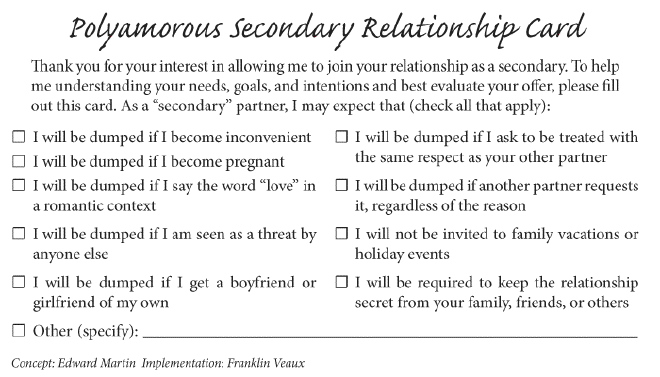Martin and Veaux’s Polyamorous Secondary Relationship Card has been making the rounds again lately. A bunch of folks in my friends circle have been having good discussions about it. There’s a reason it resonates. People still struggle to clearly communicate their wants and needs in relationships and practice informed consent.
And yeah, a lot of people treat secondary partners like they are expendable. Won’t somebody please think of the unicorns?

Don’t Treat People Like Things (Unless They Want You To) #
I was reminded of the post “ Don’t Treat People As Things.” In it, The Polyamorous Misanthrope gives advice to a married letter writer who reached out to her (after she reposted the card), looking for advice on how not to be a total jerk as they might open up their marriage in the future.
It’s a good post, laying out ways to avoid gross non-consensual objectification — as opposed to the super awesome fun and consensual kind that a lot of kinksters enjoy (roleplaying, sexploration, etc). The Misanthrope doesn’t address that in this one piece, but it’s fine. I’ve read her for years. She’s vanilla herself but makes plenty of caveats in other places about how kinksters who have negotiated certain behaviors in a consensual, ethical way are fine in her book.
But unless people really, really want you to, don’t treat them like things. This lesson is a really good reminder as our brave new world gets braver and newer.
Because, sure, a lot has stayed the same in the years since the card and Misanthrope’s post first came out, but then again, a _lot _has changed.
In fact, we now have plenty of things, all over the place, that behave like people. And not just really expensive robots that do specialized things in factories. But things that have personalities that are becoming accessible to everyone. And it’s becoming more and more acceptable, and even expected, to use them. Siri, Alexa, “Okay Google.” Customer service bots.
Artificial intelligence is becoming an increasing staple of modern life.
So it begs the question: How are we treating these things that behave like people?
Not very well, it turns out.
Dr. Sheryl Brahnam of Missouri State University found that approximately 10% to 50% of interactions with AI are abusive, with mocking or mean behavior. Per Brahnam, “Here for the first time in human history, we actually do have speaking things…we don’t know how to react to it; we’ve been taught that if you start talking to things, there is something wrong with you.”
Don’t Treat People-y Things like Things Either #
You may wonder why yelling at your virtual assistant matters. After all, one could argue it’s a healthy form of catharsis. AI could be a handy target for venting since it doesn’t have feelings to hurt.
Except — venting your anger is bad for you and actually makes it worse. Rather than serving as a healthy outlet, a way to diminish anger, angrily lashing out (even towards a safe target) reinforces those behavior patterns. You can become addicted to angry outbursts. And in turn, you become angrier and angrier over time and more prone to aggressive behaviors.
So sure, it’s probably better to let Siri, Alexa, or Google have it than.. oh, your partner.
But can’t we do better?
Do we really want to rehearse abuse?

